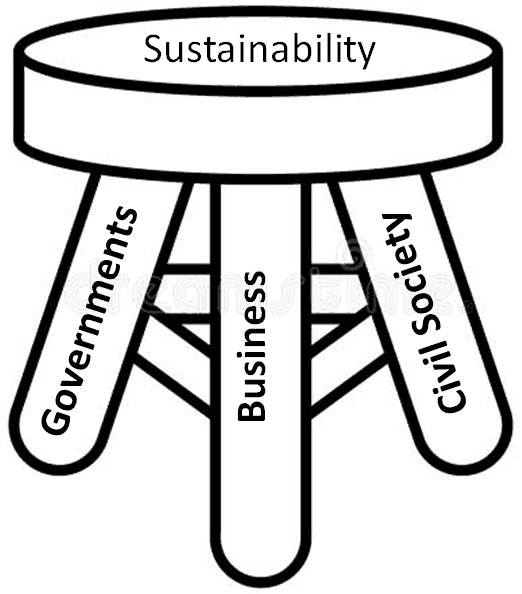
| Hari Srinivas | |
| Viewpoint Series C-055. |
 The three stakeholder groups that support the implementation of sustainable development. |
For governments, human security serves as a guiding principle for policymaking, encouraging them to prioritize the protection of their citizens from not only traditional security threats like conflicts but also from issues like poverty, health crises, and environmental hazards. By adopting a human security approach, governments can create more resilient and inclusive societies, fostering stability and sustainable development.
For businesses, embracing the concept of human security is essential for responsible and ethical practices. It urges companies to consider the impact of their operations on the well-being of employees, consumers, and communities they serve. Prioritizing human security can lead to sustainable business practices, respectful labor conditions, and investments in social development, enhancing the overall reputation and long-term viability of the organization.
Civil society entities play a critical role in advocating for human security by holding governments and businesses accountable. By raising awareness, mobilizing communities, and advocating for human rights and dignity, civil society organizations ensure that decision-makers remain committed to addressing the multifaceted challenges that impact human security. Their efforts contribute to a more participatory and democratic society, where the voices and needs of vulnerable populations are heard and addressed, fostering a stronger sense of social cohesion and collective responsibility.
Examining human security from the perspectives of these three stakeholders - governments, businesses, and civil society entities - highlights their respective roles and responsibilities in promoting and safeguarding the well-being of individuals and communities. Each of these stakeholders plays a vital role in addressing human security challenges and contributing to a safer and more sustainable world:
Governments:
- Policy Formulation: Governments have a central role in formulating policies and strategies that prioritize human security. This includes policies to address poverty, healthcare, education, social welfare, and human rights protection.
- Conflict Resolution and Prevention: Governments can work towards resolving conflicts and preventing violence through diplomatic efforts, peacebuilding initiatives, and addressing the root causes of grievances.
- Disaster Management: Governments are responsible for disaster preparedness, response, and recovery to protect their citizens from natural or human-made disasters.
- Rule of Law and Human Rights: Upholding the rule of law and protecting human rights are essential for ensuring the security and well-being of citizens. Governments should create and enforce laws that protect human rights and hold perpetrators of abuses accountable.
- Inclusive Governance: Inclusive and participatory governance enables better representation of diverse voices and ensures that policies address the needs of all segments of society.
Businesses:
- Corporate Social Responsibility (CSR): Businesses can contribute to human security through responsible business practices, including CSR initiatives that support community development, education, healthcare, and environmental sustainability.
- Fair Labor Practices: Ensuring fair wages, safe working conditions, and respect for labor rights enhances the security and well-being of employees and their families.
- Environmental Stewardship: Businesses can play a role in mitigating environmental risks and promoting sustainability, which directly impacts the long-term security and well-being of communities.
- Ethical Supply Chain: Businesses should be vigilant about their supply chains to ensure they do not contribute to human rights abuses, forced labor, or environmental degradation.
Civil Society Entities:
- Advocacy and Awareness: Civil society organizations can raise awareness about human security issues, advocate for policy changes, and promote community participation in decision-making processes.
- Service Provision: NGOs and civil society groups often play a critical role in delivering essential services, such as healthcare, education, and humanitarian aid, particularly in areas where government services are lacking.
- Monitoring and Accountability: Civil society can act as watchdogs, holding governments and businesses accountable for their actions and advocating for greater transparency and good governance.
- Conflict Mediation and Reconciliation: Civil society organizations can facilitate dialogue and mediation efforts to resolve conflicts and foster reconciliation within communities.
Collaboration and partnerships among governments, businesses, and civil society entities are essential for addressing complex human security challenges effectively. By combining their efforts and resources, these stakeholders can create more comprehensive and sustainable solutions that promote the security and well-being of individuals and communities on a global scale.
|
|
|
|
Return to Human Security Contact: Hari Srinivas - hsrinivas@gdrc.org |
